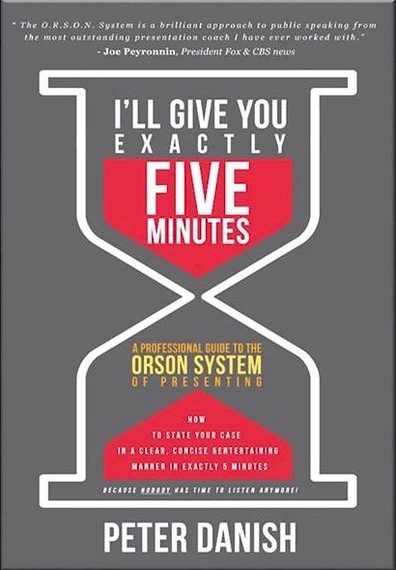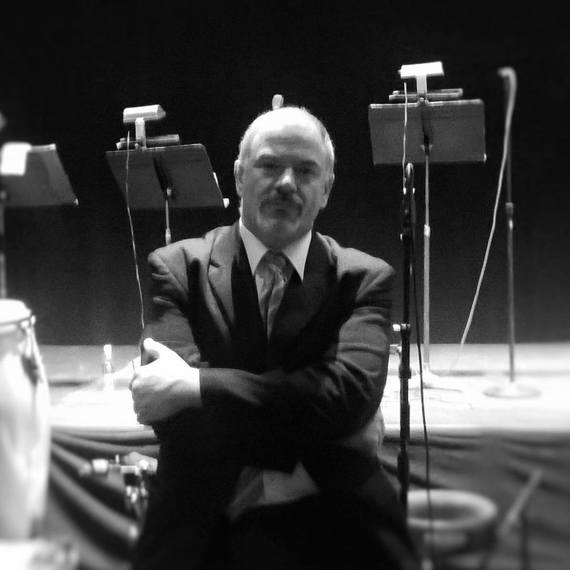What's scarier than spiders, snakes, and even the zombie apocalypse? Public speaking, which consistently ranks #1 on the list of America's fear and anxieties.
Two times in my life I've given speeches in front of a large audience. Both times the company I worked for hired Peter Danish, who for over two decades has helped countless business people -- including many C-level executives -- deliver speeches and make presentations. The coach, author, and educator has worked with leaders at companies such as NBC, PBS, Telemundo, and Fox Sports.
Danish penned a guide to rhetoric, I'll Give You Exactly Five Minutes, which was released last month as an audio book. Recently, I was able to ask the writer about his advice on public speaking, as well as his thoughts about the speech-making talents of Donald Trump, Bernie Sanders and Hillary Clinton.
Stroud: Why did you write I'll Give You Exactly Five Minutes?
Danish: I had a mentor named Steve Levin, who was completely comfortable on stage with hundreds of people looking at him. Steve was one of those folks that had absolutely no fear of public speaking.
One day, we were having a dinner with just a couple of clients -- maybe a dozen -- in a small restaurant. I saw him getting all antsy. I said, "What's the matter?" He said, "I hate getting ready for all the silly little after-dinner things. I always forget what I'm going to say." I thought, "You forget what you're going to say? You're the most natural speaker I've ever seen in my life."
He said, "I'll let you know about a little secret, Peter. I'm perfectly comfortable in front of a million people. I'd rather be in front of 500 than 5." I said, "Why are you afraid of five?" He said, "When I look someone in the eye, I tend to make a connection, and I forget where I am, and I forget what I'm supposed to say next. My mind goes blank."
If you read the literature -- and there are 60,000 titles on Amazon right now about public speaking -- that concept of your mind going blank when you go onstage is absolutely common to virtually every person who has some fear of public speaking.
Steve Levin passed away a few years ago. [Before he died,] he said to me, "You should write a book." I said, "I don't really have a system." He said, "You really do, and you probably don't even realize it. It's there somewhere."
I pulled out a box from the attic with about 50 speeches I had written over the years. Virtually no two were alike, but looking for the commonalities, I was able to diagram the steps that eventually became my ORSON system.
Stroud: How do you identify a good speech?
Danish: When I'm teaching college students or one-on-one sessions, I often give this as an exercise to people. I tell them, "Spend an hour watching TED talks and an hour watching C-SPAN. Then, take a sheet of paper, and write adjectives to describe TED versus C-SPAN."
I can tell you, almost conclusively, everyone that watches C-SPAN says, "Stiff, wooden, boring, phony," whereas everyone that watches TED says, "Brilliant, awesome, authentic, honest." I ask my students, "What do you think is the holy grail of communication?" The word is always "honesty."
Psychologists tell us people like honesty -- people trust honesty. If they sense you're being honest, you can make mistakes. You can make flubs. That's perfectly acceptable. If you look too polished, too rehearsed, you don't come across as honest, and that makes you less believable." You can't be persuasive if people don't trust you inherently. Hillary Clinton is having that issue right now.
Stroud: What's she doing?
Danish: The two folks who are getting the biggest crowds and the biggest media coverage and social media buzz have been Donald Trump on the Republican side and Bernie Sanders on the Democrat side. What do they have in common?
From a philosophical standpoint, very little, but from a presentational standpoint, they both come across as their own man. They say what they believe. They believe what they say. They don't come across like they've got an agenda to check off boxes: "Did I mention this today? Yes. Did I mention that? Check, check, check. Successful speech."
They basically speak largely extemporaneously. It's very refreshing -- even if you disagree with them on either side -- to see a politician come out there and be able to speak off-the-cuff.
In Hillary Clinton's case, I think she has been far too scripted for far too long. Watch the way she spoke when she made a speech 25 years ago. She sounded very conversational, like someone you'd want to have a beer with.
Then she became a U.S. senator. Her entire delivery system changed. She became very abrupt, very staccato. If you watch her speak now, it sounds - I hate to say it - very, very rehearsed.
Stroud: Yet one of your action points in the book is "You can't over-rehearse."
Danish: I get the sense that she is basically making absolutely certain she hits every checkpoint that is polling very well. That's more of a political thing than it is a speech-coaching thing.
When you're forced to say a lot of things that you may or may not believe simply to get the correct response from an audience, you're not being honest. Then you become a little bit superficial, no matter how you slice it and how you deliver it.
Stroud: In the book, you write, "At the end of the day, honesty and passion trump form and technique every time."
Danish: That's an expression speakers should try to live by. Don't worry about being eloquent. Be real; be authentic; be honest. People prefer honesty. People respect honesty. People trust honesty. Honesty is the linchpin in every human communication going back to the cavemen.
Stroud: What other elements are essential for strong public speaking?
Danish: When I started the concept for I'll Give You Exactly Five Minutes, it was based on that theory that you've got to be able to present yourself in a very cogent, compelling, concise -- and entertaining fashion.
I always throw entertaining in there. People like to listen to people they like at the end of the day. If you're entertaining, you've made a connection on some level.
When I started diagramming speeches, looking for those commonalities, I figured out that if you had these five basic elements, you pretty much could put together a substantive argument for almost anything: Overview, Research, Solution, Opportunity and Next Steps, or ORSON.
The logic behind that being when I heard that this brilliant presenter, Steve Levin -- best I've ever seen -- would often get lost in a presentation and forget what was coming up next, I wondered how it be possible to organize material so that you'd never forget what's coming up next?
That was where the ORSON system came from. The idea is once you start with the correct opening statement, you'll never lose where you are. When you're in the overview, you know the research is coming next. When you're doing the research, you know the solution is coming next and so on.
Stroud: What's next for you?
Danish: My publisher has just released the audio book for I'll Give You Exactly Five Minutes. You can get it at Amazon or Audible.com.
I've also just released a brand new novel called Medjugorje: The Final Prophecy. It's about the Bosnian town where children are seeing visions of the Virgin Mary and millions of pilgrims are visiting in hope of a miracle. The early reviews have been extremely positive and I'm currently on a book tour promoting the novel. The timing was perfect because Pope Francis just announced that the Vatican is going to establish an ongoing supervisor of Medjugorje, which may be a precursor to the Catholic Church recognizing the visions and the miracles. As soon as I get a little free time, I'm going to start on the audio book of Medjugorje as well.

